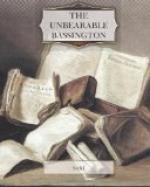One person in the whole world had cared for him, for longer than he could remember, cared for him perhaps more than he knew, cared for him perhaps now. But a wall of ice had mounted up between him and her, and across it there blew that cold-breath that chills or kills affection.
The words of a well-known old song, the wistful cry of a lost cause, rang with insistent mockery through his brain:
“Better loved you canna be,
Will ye ne’er come back again?”
If it was love that was to bring him back he must be an exile for ever. His epitaph in the mouths of those that remembered him would be, Comus Bassington, the boy who never came back.
And in his unutterable loneliness he bowed his head on his arms, that he might not see the joyous scrambling frolic on yonder hillside.
CHAPTER XVII
The bleak rawness of a grey December day held sway over St. James’s Park, that sanctuary of lawn and tree and pool, into which the bourgeois innovator has rushed ambitiously time and again, to find that he must take the patent leather from off his feet, for the ground on which he stands is hallowed ground.
In the lonely hour of early afternoon, when the workers had gone back to their work, and the loiterers were scarcely yet gathered again, Francesca Bassington made her way restlessly along the stretches of gravelled walk that bordered the ornamental water. The overmastering unhappiness that filled her heart and stifled her thinking powers found answering echo in her surroundings. There is a sorrow that lingers in old parks and gardens that the busy streets have no leisure to keep by them; the dead must bury their dead in Whitehall or the Place de la Concorde, but there are quieter spots where they may still keep tryst with the living and intrude the memory of their bygone selves on generations that have almost forgotten them. Even in tourist-trampled Versailles the desolation of a tragedy that cannot die haunts the terraces and fountains like a bloodstain that will not wash out; in the Saxon Garden at Warsaw there broods the memory of long-dead things, coeval with the stately trees that shade its walks, and with the carp that swim to-day in its ponds as they doubtless swam there when “Lieber Augustin” was a living person and not as yet an immortal couplet. And St. James’s Park, with its lawns and walks and waterfowl, harbours still its associations with a bygone order of men and women, whose happiness and sadness are woven into its history, dim and grey as they were once bright and glowing, like the faded pattern worked into the fabric of an old tapestry. It was here that Francesca had made her way when the intolerable inaction of waiting had driven her forth from her home. She was waiting for that worst news of all, the news which does not kill hope, because there has been none to kill, but merely ends suspense. An early message had said that Comus




